Disruptive Innovation in Hospitality: A Case Study of Airbnb
VerifiedAdded on 2023/01/07
|8
|1482
|32
AI Summary
This report provides a deeper insight into the disruptive innovation of Airbnb in the hospitality industry. It discusses the company overview, its role as a disruptive innovation, critical analysis, and future growth opportunities. The report highlights the strengths and weaknesses of Airbnb's business model and its potential for future growth.
Contribute Materials
Your contribution can guide someone’s learning journey. Share your
documents today.

Foundations of Information
Systems
Systems
Secure Best Marks with AI Grader
Need help grading? Try our AI Grader for instant feedback on your assignments.
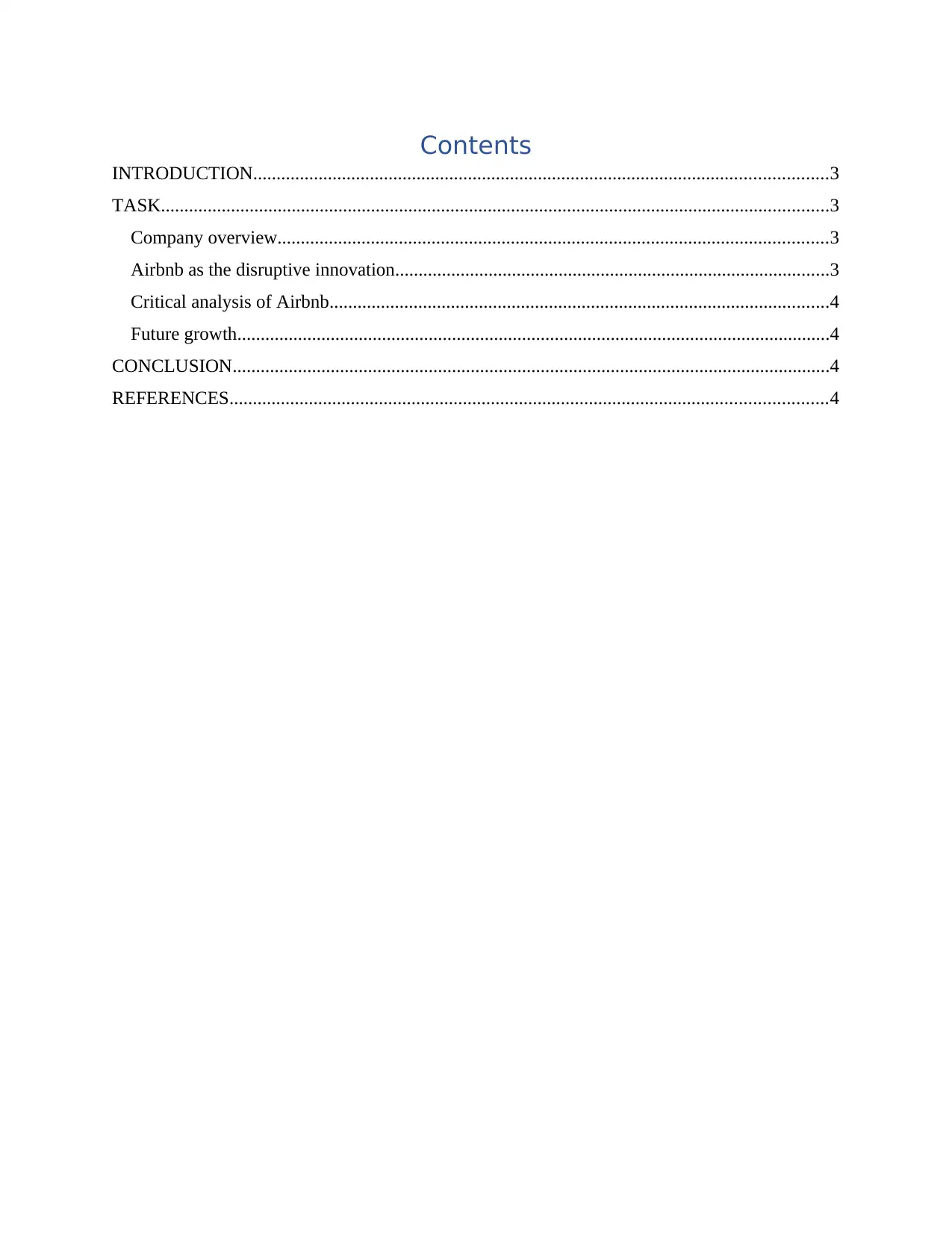
Contents
INTRODUCTION...........................................................................................................................3
TASK...............................................................................................................................................3
Company overview......................................................................................................................3
Airbnb as the disruptive innovation.............................................................................................3
Critical analysis of Airbnb...........................................................................................................4
Future growth...............................................................................................................................4
CONCLUSION................................................................................................................................4
REFERENCES................................................................................................................................4
INTRODUCTION...........................................................................................................................3
TASK...............................................................................................................................................3
Company overview......................................................................................................................3
Airbnb as the disruptive innovation.............................................................................................3
Critical analysis of Airbnb...........................................................................................................4
Future growth...............................................................................................................................4
CONCLUSION................................................................................................................................4
REFERENCES................................................................................................................................4
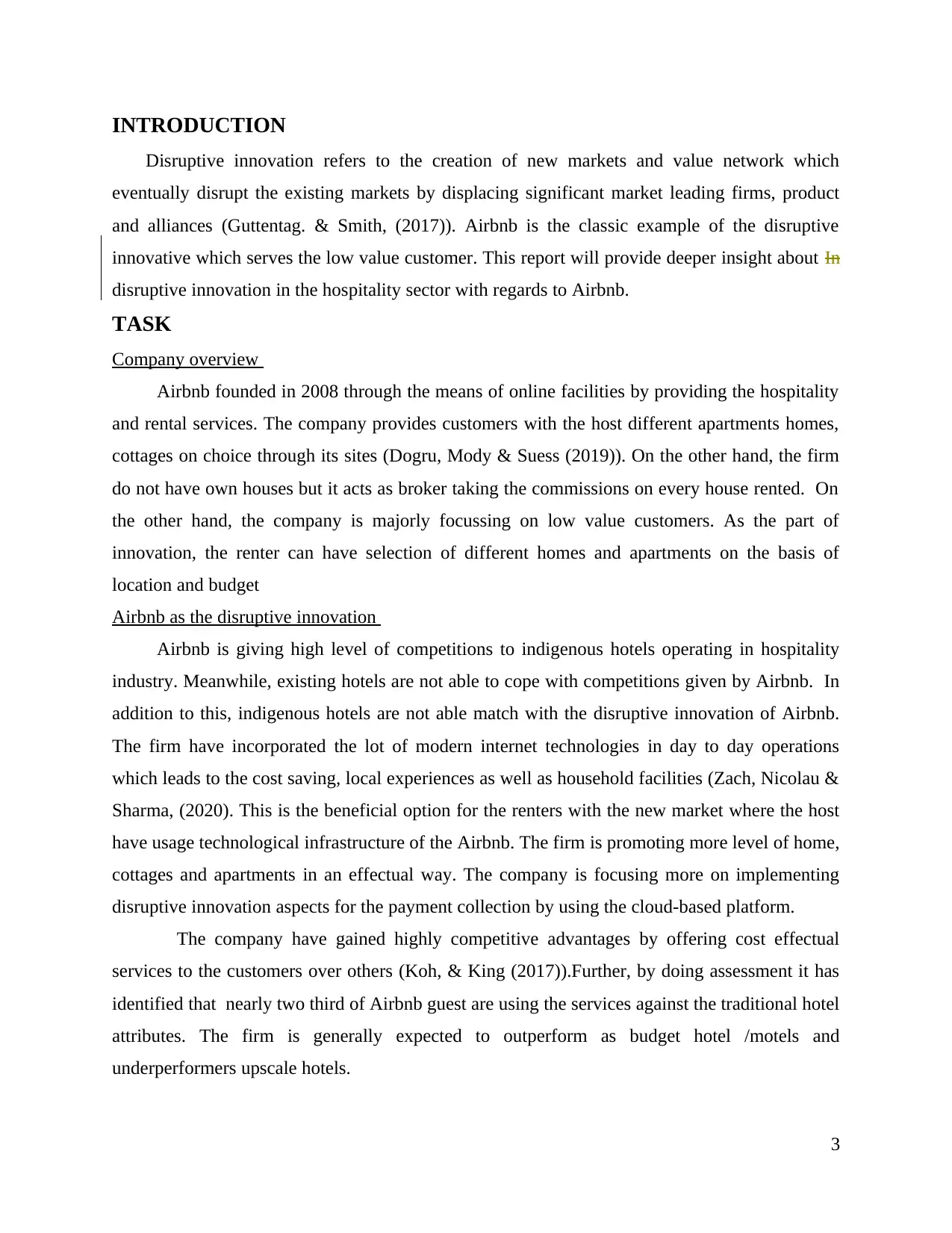
INTRODUCTION
Disruptive innovation refers to the creation of new markets and value network which
eventually disrupt the existing markets by displacing significant market leading firms, product
and alliances (Guttentag. & Smith, (2017)). Airbnb is the classic example of the disruptive
innovative which serves the low value customer. This report will provide deeper insight about In
disruptive innovation in the hospitality sector with regards to Airbnb.
TASK
Company overview
Airbnb founded in 2008 through the means of online facilities by providing the hospitality
and rental services. The company provides customers with the host different apartments homes,
cottages on choice through its sites (Dogru, Mody & Suess (2019)). On the other hand, the firm
do not have own houses but it acts as broker taking the commissions on every house rented. On
the other hand, the company is majorly focussing on low value customers. As the part of
innovation, the renter can have selection of different homes and apartments on the basis of
location and budget
Airbnb as the disruptive innovation
Airbnb is giving high level of competitions to indigenous hotels operating in hospitality
industry. Meanwhile, existing hotels are not able to cope with competitions given by Airbnb. In
addition to this, indigenous hotels are not able match with the disruptive innovation of Airbnb.
The firm have incorporated the lot of modern internet technologies in day to day operations
which leads to the cost saving, local experiences as well as household facilities (Zach, Nicolau &
Sharma, (2020). This is the beneficial option for the renters with the new market where the host
have usage technological infrastructure of the Airbnb. The firm is promoting more level of home,
cottages and apartments in an effectual way. The company is focusing more on implementing
disruptive innovation aspects for the payment collection by using the cloud-based platform.
The company have gained highly competitive advantages by offering cost effectual
services to the customers over others (Koh, & King (2017)).Further, by doing assessment it has
identified that nearly two third of Airbnb guest are using the services against the traditional hotel
attributes. The firm is generally expected to outperform as budget hotel /motels and
underperformers upscale hotels.
3
Disruptive innovation refers to the creation of new markets and value network which
eventually disrupt the existing markets by displacing significant market leading firms, product
and alliances (Guttentag. & Smith, (2017)). Airbnb is the classic example of the disruptive
innovative which serves the low value customer. This report will provide deeper insight about In
disruptive innovation in the hospitality sector with regards to Airbnb.
TASK
Company overview
Airbnb founded in 2008 through the means of online facilities by providing the hospitality
and rental services. The company provides customers with the host different apartments homes,
cottages on choice through its sites (Dogru, Mody & Suess (2019)). On the other hand, the firm
do not have own houses but it acts as broker taking the commissions on every house rented. On
the other hand, the company is majorly focussing on low value customers. As the part of
innovation, the renter can have selection of different homes and apartments on the basis of
location and budget
Airbnb as the disruptive innovation
Airbnb is giving high level of competitions to indigenous hotels operating in hospitality
industry. Meanwhile, existing hotels are not able to cope with competitions given by Airbnb. In
addition to this, indigenous hotels are not able match with the disruptive innovation of Airbnb.
The firm have incorporated the lot of modern internet technologies in day to day operations
which leads to the cost saving, local experiences as well as household facilities (Zach, Nicolau &
Sharma, (2020). This is the beneficial option for the renters with the new market where the host
have usage technological infrastructure of the Airbnb. The firm is promoting more level of home,
cottages and apartments in an effectual way. The company is focusing more on implementing
disruptive innovation aspects for the payment collection by using the cloud-based platform.
The company have gained highly competitive advantages by offering cost effectual
services to the customers over others (Koh, & King (2017)).Further, by doing assessment it has
identified that nearly two third of Airbnb guest are using the services against the traditional hotel
attributes. The firm is generally expected to outperform as budget hotel /motels and
underperformers upscale hotels.
3
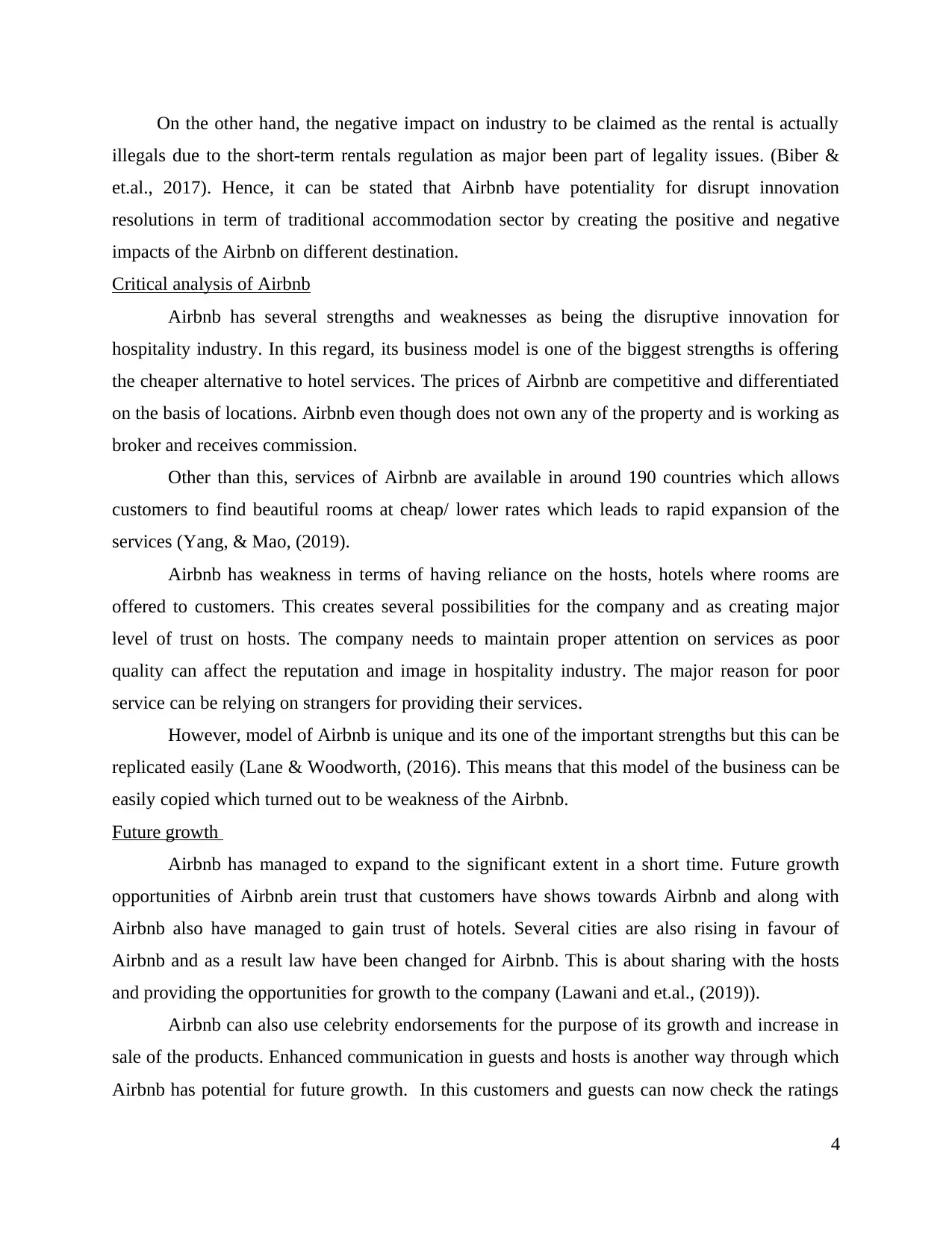
On the other hand, the negative impact on industry to be claimed as the rental is actually
illegals due to the short-term rentals regulation as major been part of legality issues. (Biber &
et.al., 2017). Hence, it can be stated that Airbnb have potentiality for disrupt innovation
resolutions in term of traditional accommodation sector by creating the positive and negative
impacts of the Airbnb on different destination.
Critical analysis of Airbnb
Airbnb has several strengths and weaknesses as being the disruptive innovation for
hospitality industry. In this regard, its business model is one of the biggest strengths is offering
the cheaper alternative to hotel services. The prices of Airbnb are competitive and differentiated
on the basis of locations. Airbnb even though does not own any of the property and is working as
broker and receives commission.
Other than this, services of Airbnb are available in around 190 countries which allows
customers to find beautiful rooms at cheap/ lower rates which leads to rapid expansion of the
services (Yang, & Mao, (2019).
Airbnb has weakness in terms of having reliance on the hosts, hotels where rooms are
offered to customers. This creates several possibilities for the company and as creating major
level of trust on hosts. The company needs to maintain proper attention on services as poor
quality can affect the reputation and image in hospitality industry. The major reason for poor
service can be relying on strangers for providing their services.
However, model of Airbnb is unique and its one of the important strengths but this can be
replicated easily (Lane & Woodworth, (2016). This means that this model of the business can be
easily copied which turned out to be weakness of the Airbnb.
Future growth
Airbnb has managed to expand to the significant extent in a short time. Future growth
opportunities of Airbnb arein trust that customers have shows towards Airbnb and along with
Airbnb also have managed to gain trust of hotels. Several cities are also rising in favour of
Airbnb and as a result law have been changed for Airbnb. This is about sharing with the hosts
and providing the opportunities for growth to the company (Lawani and et.al., (2019)).
Airbnb can also use celebrity endorsements for the purpose of its growth and increase in
sale of the products. Enhanced communication in guests and hosts is another way through which
Airbnb has potential for future growth. In this customers and guests can now check the ratings
4
illegals due to the short-term rentals regulation as major been part of legality issues. (Biber &
et.al., 2017). Hence, it can be stated that Airbnb have potentiality for disrupt innovation
resolutions in term of traditional accommodation sector by creating the positive and negative
impacts of the Airbnb on different destination.
Critical analysis of Airbnb
Airbnb has several strengths and weaknesses as being the disruptive innovation for
hospitality industry. In this regard, its business model is one of the biggest strengths is offering
the cheaper alternative to hotel services. The prices of Airbnb are competitive and differentiated
on the basis of locations. Airbnb even though does not own any of the property and is working as
broker and receives commission.
Other than this, services of Airbnb are available in around 190 countries which allows
customers to find beautiful rooms at cheap/ lower rates which leads to rapid expansion of the
services (Yang, & Mao, (2019).
Airbnb has weakness in terms of having reliance on the hosts, hotels where rooms are
offered to customers. This creates several possibilities for the company and as creating major
level of trust on hosts. The company needs to maintain proper attention on services as poor
quality can affect the reputation and image in hospitality industry. The major reason for poor
service can be relying on strangers for providing their services.
However, model of Airbnb is unique and its one of the important strengths but this can be
replicated easily (Lane & Woodworth, (2016). This means that this model of the business can be
easily copied which turned out to be weakness of the Airbnb.
Future growth
Airbnb has managed to expand to the significant extent in a short time. Future growth
opportunities of Airbnb arein trust that customers have shows towards Airbnb and along with
Airbnb also have managed to gain trust of hotels. Several cities are also rising in favour of
Airbnb and as a result law have been changed for Airbnb. This is about sharing with the hosts
and providing the opportunities for growth to the company (Lawani and et.al., (2019)).
Airbnb can also use celebrity endorsements for the purpose of its growth and increase in
sale of the products. Enhanced communication in guests and hosts is another way through which
Airbnb has potential for future growth. In this customers and guests can now check the ratings
4
Secure Best Marks with AI Grader
Need help grading? Try our AI Grader for instant feedback on your assignments.
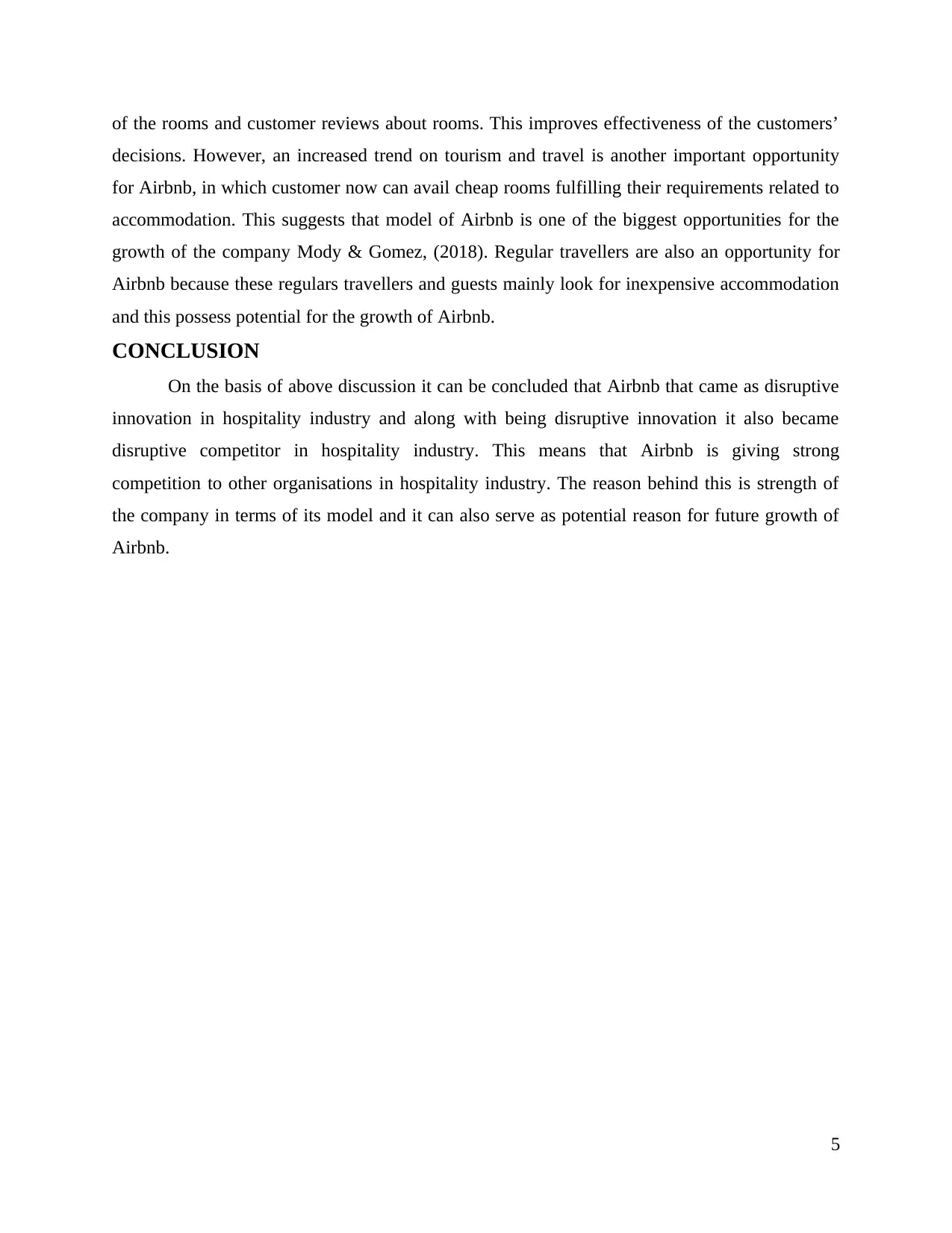
of the rooms and customer reviews about rooms. This improves effectiveness of the customers’
decisions. However, an increased trend on tourism and travel is another important opportunity
for Airbnb, in which customer now can avail cheap rooms fulfilling their requirements related to
accommodation. This suggests that model of Airbnb is one of the biggest opportunities for the
growth of the company Mody & Gomez, (2018). Regular travellers are also an opportunity for
Airbnb because these regulars travellers and guests mainly look for inexpensive accommodation
and this possess potential for the growth of Airbnb.
CONCLUSION
On the basis of above discussion it can be concluded that Airbnb that came as disruptive
innovation in hospitality industry and along with being disruptive innovation it also became
disruptive competitor in hospitality industry. This means that Airbnb is giving strong
competition to other organisations in hospitality industry. The reason behind this is strength of
the company in terms of its model and it can also serve as potential reason for future growth of
Airbnb.
5
decisions. However, an increased trend on tourism and travel is another important opportunity
for Airbnb, in which customer now can avail cheap rooms fulfilling their requirements related to
accommodation. This suggests that model of Airbnb is one of the biggest opportunities for the
growth of the company Mody & Gomez, (2018). Regular travellers are also an opportunity for
Airbnb because these regulars travellers and guests mainly look for inexpensive accommodation
and this possess potential for the growth of Airbnb.
CONCLUSION
On the basis of above discussion it can be concluded that Airbnb that came as disruptive
innovation in hospitality industry and along with being disruptive innovation it also became
disruptive competitor in hospitality industry. This means that Airbnb is giving strong
competition to other organisations in hospitality industry. The reason behind this is strength of
the company in terms of its model and it can also serve as potential reason for future growth of
Airbnb.
5
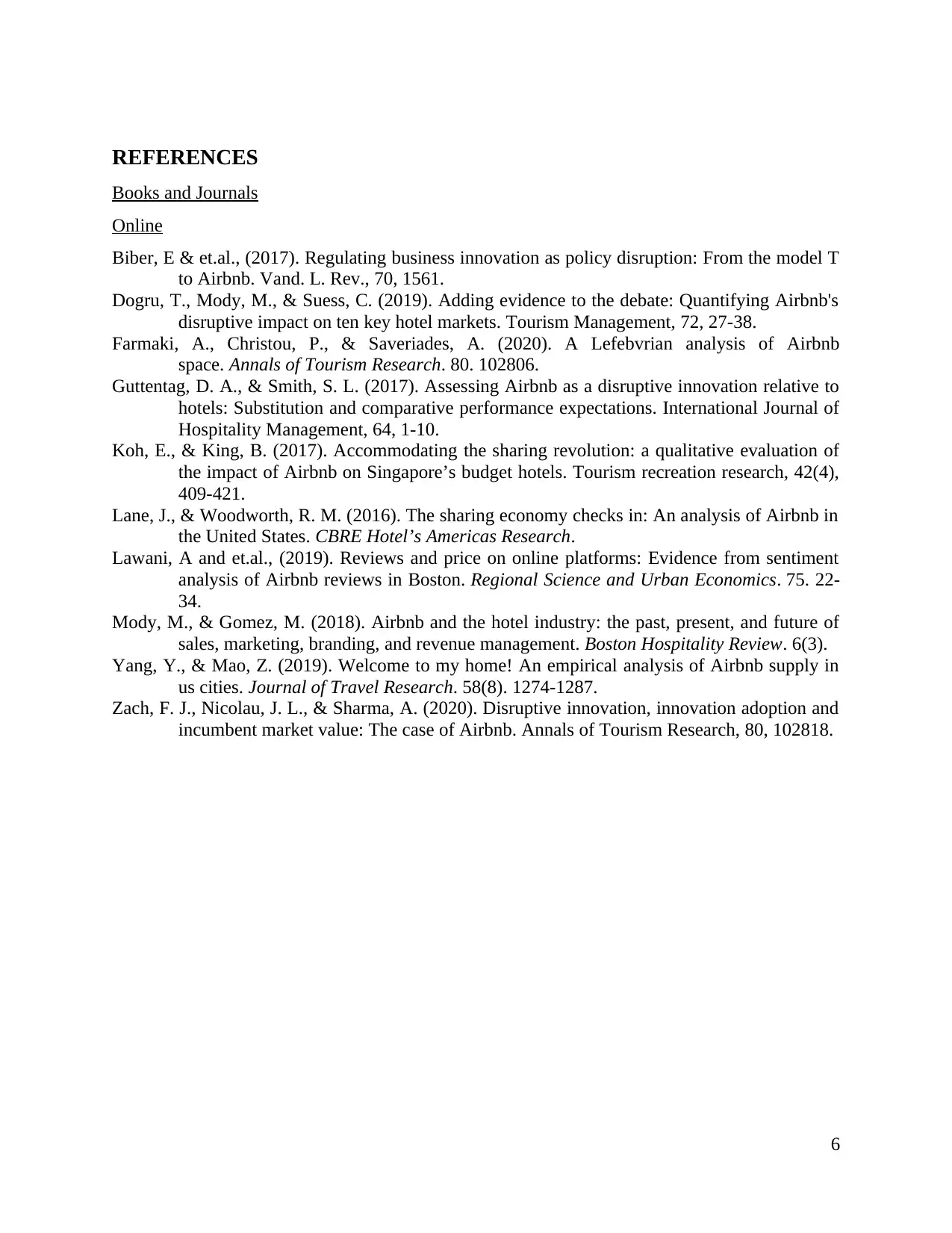
REFERENCES
Books and Journals
Online
Biber, E & et.al., (2017). Regulating business innovation as policy disruption: From the model T
to Airbnb. Vand. L. Rev., 70, 1561.
Dogru, T., Mody, M., & Suess, C. (2019). Adding evidence to the debate: Quantifying Airbnb's
disruptive impact on ten key hotel markets. Tourism Management, 72, 27-38.
Farmaki, A., Christou, P., & Saveriades, A. (2020). A Lefebvrian analysis of Airbnb
space. Annals of Tourism Research. 80. 102806.
Guttentag, D. A., & Smith, S. L. (2017). Assessing Airbnb as a disruptive innovation relative to
hotels: Substitution and comparative performance expectations. International Journal of
Hospitality Management, 64, 1-10.
Koh, E., & King, B. (2017). Accommodating the sharing revolution: a qualitative evaluation of
the impact of Airbnb on Singapore’s budget hotels. Tourism recreation research, 42(4),
409-421.
Lane, J., & Woodworth, R. M. (2016). The sharing economy checks in: An analysis of Airbnb in
the United States. CBRE Hotel’s Americas Research.
Lawani, A and et.al., (2019). Reviews and price on online platforms: Evidence from sentiment
analysis of Airbnb reviews in Boston. Regional Science and Urban Economics. 75. 22-
34.
Mody, M., & Gomez, M. (2018). Airbnb and the hotel industry: the past, present, and future of
sales, marketing, branding, and revenue management. Boston Hospitality Review. 6(3).
Yang, Y., & Mao, Z. (2019). Welcome to my home! An empirical analysis of Airbnb supply in
us cities. Journal of Travel Research. 58(8). 1274-1287.
Zach, F. J., Nicolau, J. L., & Sharma, A. (2020). Disruptive innovation, innovation adoption and
incumbent market value: The case of Airbnb. Annals of Tourism Research, 80, 102818.
6
Books and Journals
Online
Biber, E & et.al., (2017). Regulating business innovation as policy disruption: From the model T
to Airbnb. Vand. L. Rev., 70, 1561.
Dogru, T., Mody, M., & Suess, C. (2019). Adding evidence to the debate: Quantifying Airbnb's
disruptive impact on ten key hotel markets. Tourism Management, 72, 27-38.
Farmaki, A., Christou, P., & Saveriades, A. (2020). A Lefebvrian analysis of Airbnb
space. Annals of Tourism Research. 80. 102806.
Guttentag, D. A., & Smith, S. L. (2017). Assessing Airbnb as a disruptive innovation relative to
hotels: Substitution and comparative performance expectations. International Journal of
Hospitality Management, 64, 1-10.
Koh, E., & King, B. (2017). Accommodating the sharing revolution: a qualitative evaluation of
the impact of Airbnb on Singapore’s budget hotels. Tourism recreation research, 42(4),
409-421.
Lane, J., & Woodworth, R. M. (2016). The sharing economy checks in: An analysis of Airbnb in
the United States. CBRE Hotel’s Americas Research.
Lawani, A and et.al., (2019). Reviews and price on online platforms: Evidence from sentiment
analysis of Airbnb reviews in Boston. Regional Science and Urban Economics. 75. 22-
34.
Mody, M., & Gomez, M. (2018). Airbnb and the hotel industry: the past, present, and future of
sales, marketing, branding, and revenue management. Boston Hospitality Review. 6(3).
Yang, Y., & Mao, Z. (2019). Welcome to my home! An empirical analysis of Airbnb supply in
us cities. Journal of Travel Research. 58(8). 1274-1287.
Zach, F. J., Nicolau, J. L., & Sharma, A. (2020). Disruptive innovation, innovation adoption and
incumbent market value: The case of Airbnb. Annals of Tourism Research, 80, 102818.
6

7
Paraphrase This Document
Need a fresh take? Get an instant paraphrase of this document with our AI Paraphraser

8
1 out of 8
Related Documents
Your All-in-One AI-Powered Toolkit for Academic Success.
+13062052269
info@desklib.com
Available 24*7 on WhatsApp / Email
![[object Object]](/_next/static/media/star-bottom.7253800d.svg)
Unlock your academic potential
© 2024 | Zucol Services PVT LTD | All rights reserved.





